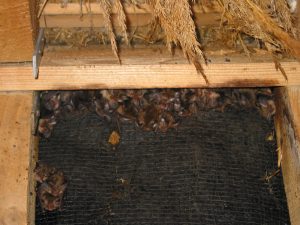Bat Conservation Ireland endeavours to provide as much information as possible on this website to address your questions.
We regret that we are not in a position to provide a helpline service for concerned householders.
If, after reading through this website, you need further assistance please contact the National Parks and Wildlife Service in the Republic of Ireland on (01) 888 3200 or in Northern Ireland telephone CEDaR on 028 9039 5264.
However, please read this information first as you may find your questions are answered below.
For many people, their first contact with bats is finding some rather mouse-like droppings in the attic, or on an outdoor windowsill. The bats themselves may be visible clustering in the attic, or less often a lost bat might be found circling the living room or clinging to the curtains.
Common concerns and the facts about living with bats
- Bats are not rodents and will not nibble or gnaw at wood, wires or insulation.
- Bats do not build nests and do not bring bedding material into the roost; nor do they bring their food into the roost.
- All bats in Ireland only eat insects and some eat thousands of these each night. So they are a great form of natural pest control!
- Bat droppings are dry and crumble away to dust. As a result, there are no known health risks associated with them in Ireland.
- Female bats have only one baby a year, so bat roosts do not become ‘infested’.
- Most bats are seasonal visitors to buildings – they are unlikely to live (roost) in the same building all year round. Many bats are loyal to their roosts and so usually return to the same buildings year after year.
- Bats are clean and sociable animals and spend many hours grooming themselves.
- In limited studies of Irish bats they have not tested positive for rabies, although a very small proportion of bats in the UK are carriers. Rabies is transmitted through a bite or a scratch from an infected bat. It is not spread through urine or droppings. Ireland has been rabies free since 1903 and Northern Ireland since 1923, and there has never been a case in Ireland of bat rabies transmitted to a human. You are not at risk of rabies if you do not handle a bat. For advice on safely dealing with a grounded bat see here.
- Bats are not interested in sharing your living space. They may roost in an attic void or roof but the only time they come into the lived-in part of houses is by mistake.
- Bats are protected. Populations of many species declined in Europe and as a result bats are now protected across the EU. This means that it is illegal to deliberately kill or injure a bat or to exclude it from a roost. If you need to carry out work on a roost, for example, re-roofing of a building that is known to have bats, please seek advice on how to do this from one of the agencies below. They will most likely be able to explain that the work should be timed so as not to cause to disturbance or abandonment of babies by mothers. In addition, they may request that you incorporate some access to the re-roofed building for bats to return.
We have a downloadable leaflet concerning bats in buildings with guidance notes for builders and developers. If you have read the information in this website and you have concerns about problems caused by bats in your dwelling house please contact the National Parks and Wildlife Service. This organisation is the statutory agency that is responsible for wildlife conservation and legislation in the Republic of Ireland.
In Northern Ireland you can contact the Northern Ireland Environment Agency or CEDaR on 028 9039 5264.
Unfortunately, Bat Conservation Ireland is currently unable to provide telephone assistance for householders due to a lack of resources.


